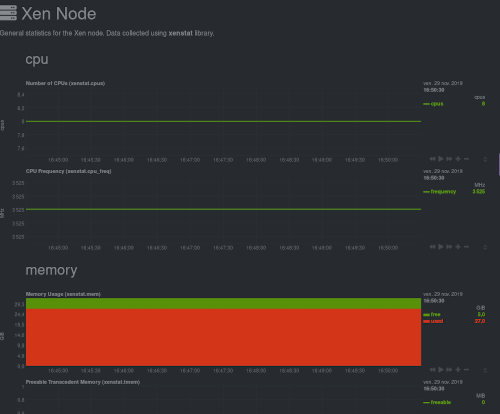Netdata package is now available in XCP-ng
-
Thanks for the feedback

-
I know this topic is quite old but I thought I might add a point here to installing Netdata manually.
Installing Netdata manually
If you want to do it your way, no problem Just run yum install netdata-ui on each host you want to monitor and that's it. You can just go on http://host_address:19999 and enjoy all the metrics.
Just run yum install netdata-ui on each host you want to monitor and that's it. You can just go on http://host_address:19999 and enjoy all the metrics.These instructions are correct however at least for me in the xcp-ng 8.0 release there is an active firewall in place. You'll need to open the port 19999 within iptables. The config file for iptables is /etc/sysconfig/iptables. Edit the file to open the port and try to be as restrictive if possible possible filtering by source port. Restart the firewall service:
systemctl restart iptables.service
Access can be further restricted as well within the netdata setup as documented here: https://docs.netdata.cloud/web/server/. You can setup psuedo access-control-lists and even add SSL certs if necessary.
-
The netdata-ui package automatically opens the 19999 port. It didn't work for you? Any error message during installation?
-
@stormi said in Netdata package is now available in XCP-ng:
netdata-ui
It does but it's too open, so ones can decide to edit this rule and restrict it further
NETDATA all -- anywhere anywhere
-
I'll try to install package again manually once I upgrade to 8.1. Unfortunately for me on 8.0 the firewall port wasn't opened. I'll report once I upgrade.
-
It may fail to open the port if there are local changes to iptables rules.
-
Hi,
Would pulling the latest version of netdata into each host break anything?
ie running from the cli: bash <(curl -Ss https://my-netdata.io/kickstart.sh) -
Despite being not supported as any dom0 modification, it would probably not include Xen support.
-
@MrMike please use our packages
-
Just being curious, your packages, they use a private registry on the xoa server itself?
-
All RPMs are installed from our public repositories, if that's the question.
- Using XOA to install netdata will install the
netdatapackage to XCP-ng and configure it to stream towards XOA's netdata. - Or,
yum install netdata-uion XCP-ng will get you a working netdata with default settings and will open port 19999
- Using XOA to install netdata will install the
-
I meant about the how netdata centralizes the nodes information on xoa host:
is this how the xoa plugin/packages was configured?
https://learn.netdata.cloud/docs/agent/registry/#run-your-own-registry -
Ping @nraynaud
-
It's using Netdata streaming. Please read Netdata documentation.
-
@MrMike Hi, The netdata on the hosts is configured to stream towards the Xen Orchestra VM when activated from there.
Nicolas.
-
yea, that's exactly what I was wondering. I'm curious how it was done. I was thinking of doing something similar for my ELK cluster and a few other systems.
-
The Netdata plugin is really great, but would like to be able to stream to cloud.netdata but for that to work we need to have an updated package >=1.20
Is there a package update in the works?
-
-
Hmm, I did not plan to update netdata before the next release of XCP-ng, because I don't trust their QA enough for that. However I can provide updated packages in the testing repo.
-
Testing would be fine when @r1 modification is done
 With enough community to test it, we can promote it into main then
With enough community to test it, we can promote it into main then 
